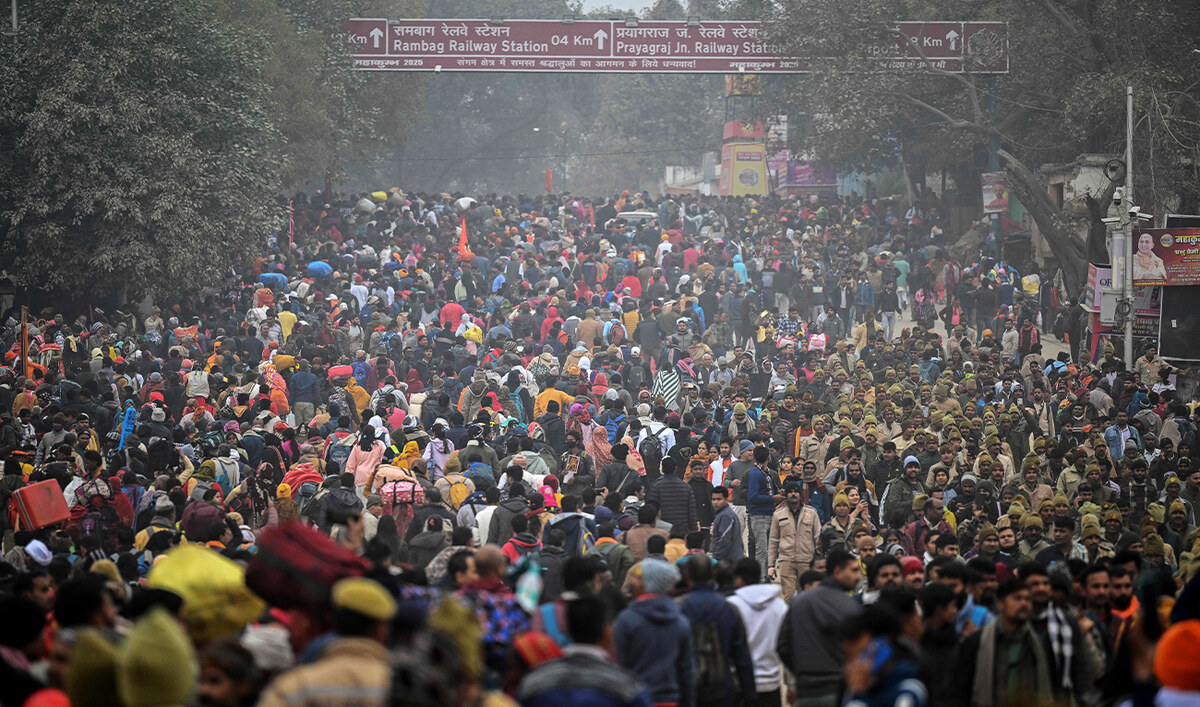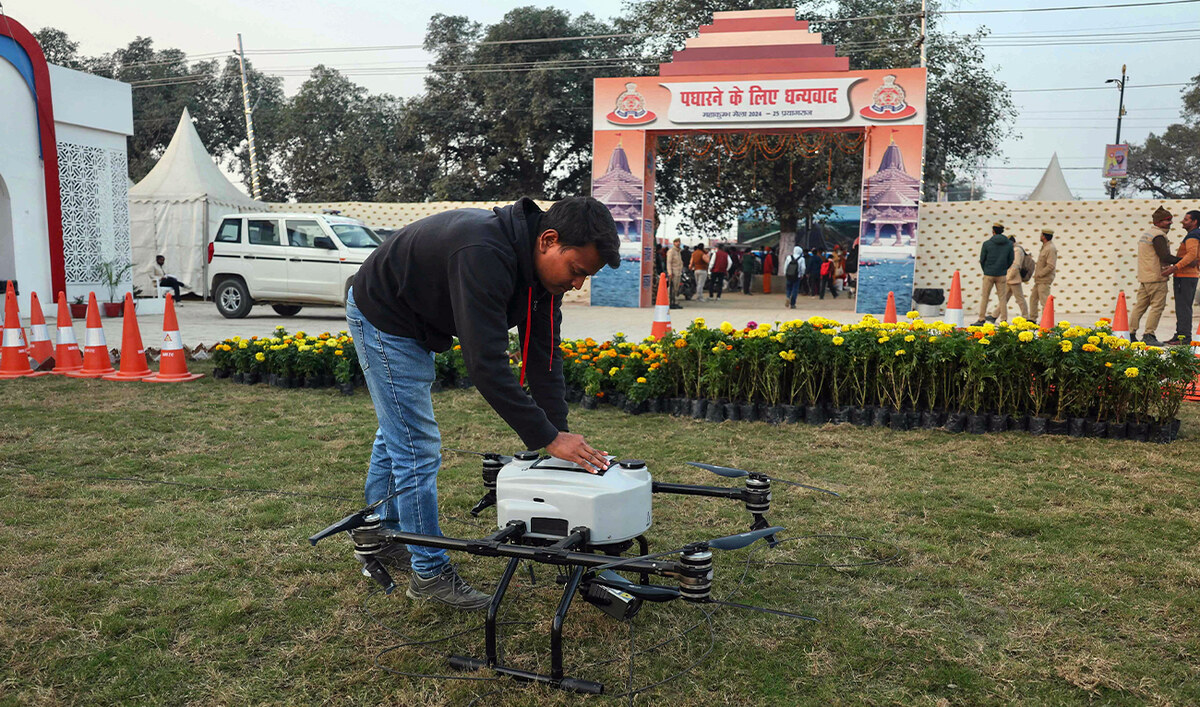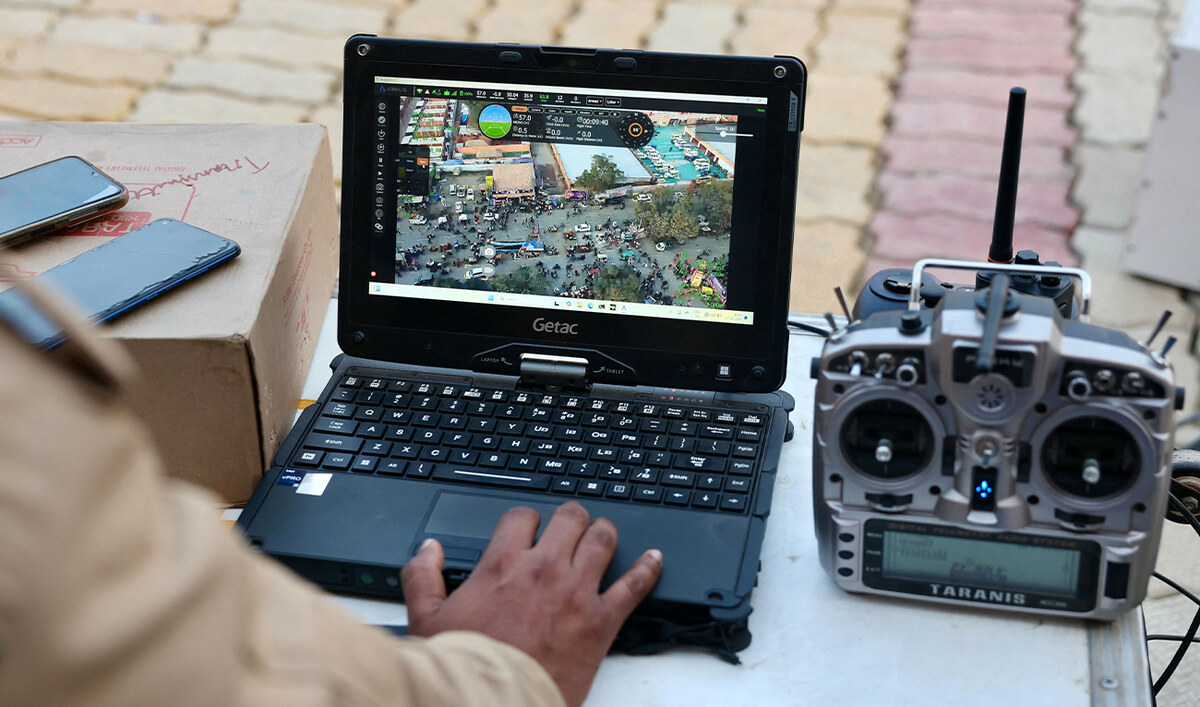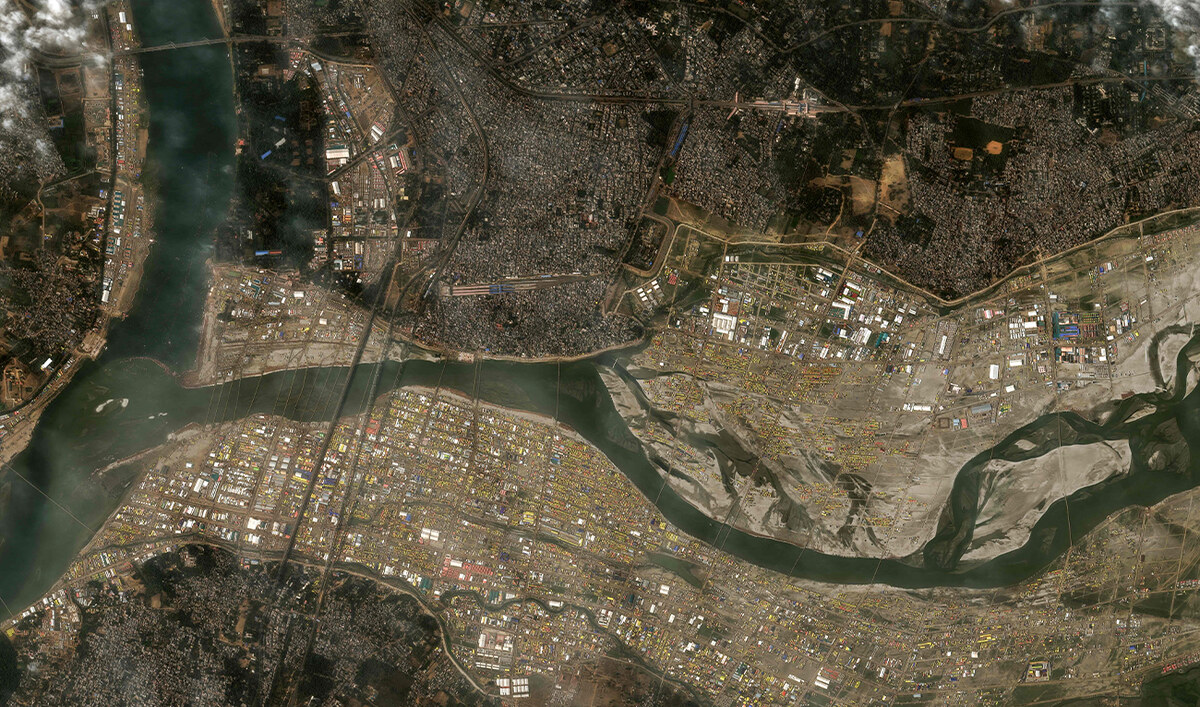BAKU: Cities in Asia and the United States emit the most heat-trapping gas that feeds climate change, with Shanghai the most polluting, according to new data that combines observations and artificial intelligence.
Nations at UN climate talks in Baku, Azerbaijan are trying to set new targets to cut such emissions and figure out how much rich nations will pay to help the world with that task. The data comes as climate officials and activists alike are growing increasingly frustrated with what they see as the talks’ — and the world’s — inability to clamp down on planet-warming fossil fuels and the countries and companies that promote them.
Seven states or provinces spew more than 1 billion metric tons of greenhouse gases, all of them in China, except Texas, which ranks sixth, according to new data from an organization co-founded by former US Vice President Al Gore and released Friday at COP29.
Using satellite and ground observations, supplemented by artificial intelligence to fill in gaps, Climate Trace sought to quantify heat-trapping carbon dioxide, methane and nitrous oxide, as well as other traditional air pollutants worldwide, including for the first time in more than 9,000 urban areas.
Earth’s total carbon dioxide and methane pollution grew 0.7 percent to 61.2 billion metric tons with the short-lived but extra potent methane rising 0.2 percent. The figures are higher than other datasets “because we have such comprehensive coverage and we have observed more emissions in more sectors than are typically available,” said Gavin McCormick, Climate Trace’s co-founder.
Plenty of big cities emit far more than some nations
Shanghai’s 256 million metric tons of greenhouse gases led all cities and exceeded those from the nations of Colombia or Norway. Tokyo’s 250 million metric tons would rank in the top 40 of nations if it were a country, while New York City’s 160 million metric tons and Houston’s 150 million metric tons would be in the top 50 of countrywide emissions. Seoul, South Korea, ranks fifth among cities at 142 million metric tons.
“One of the sites in the Permian Basin in Texas is by far the No. 1 worst polluting site in the entire world,” Gore said. “And maybe I shouldn’t have been surprised by that, but I think of how dirty some of these sites are in Russia and China and so forth. But Permian Basin is putting them all in the shade.”
China, India, Iran, Indonesia and Russia had the biggest increases in emissions from 2022 to 2023, while Venezuela, Japan, Germany, the United Kingdom and the United States had the biggest decreases in pollution.
The dataset — maintained by scientists and analysts from various groups — also looked at traditional pollutants such as carbon monoxide, volatile organic compounds, ammonia, sulfur dioxide and other chemicals associated with dirty air. Burning fossil fuels releases both types of pollution, Gore said.
This “represents the single biggest health threat facing humanity,” Gore said.
Climate talks wrestle with fossil fuel interests
Gore criticized the hosting of climate talks, called COPs, by Azerbaijan, an oil nation and site of the world’s first oil wells, and by the United Arab Emirates last year.
“It’s unfortunate that the fossil fuel industry and the petrostates have seized control of the COP process to an unhealthy degree,” Gore said. “Next year in Brazil, we’ll see a change in that pattern. But, you know, it’s not good for the world community to give the No. 1 polluting industry in the world that much control over the whole process.”
Brazil President Luiz Inácio Lula da Silva has called for more to be done on climate change and has sought to slow deforestation since returning for a third term as president. But Brazil last year produced more oil than both Azerbaijan and the United Arab Emirates, according to the US Energy Information Administration.
On Friday, former UN secretary-general Ban Ki-moon, former UN climate chief Christina Figueres and leading climate scientists released a letter calling for “an urgent overhaul” on climate talks.
The letter said the “global climate process has been captured and is no longer fit for purpose” in response to Azerbaijan’s president Ilham Aliyev saying that oil and gas are a “gift of the gods.”
UN Environment Programme Executive Director Inger Andresen said she understands much of the frustration in the letter calling for massive reform of the negotiation process, but said their push to slash emissions fits nicely with UN Secretary-General Antonio Guterres’ constant prodding.
One key benefit of the UN climate talks process is it is the only place where victim small island nations have an equal seat at the table, Andersen told The Associated Press. But the process has its limits because “the rules of the game are set by member states,” she said.
An analysis from the Kick Big Polluters Out coalition said Friday that the official attendance list of the talks featured at least 1,770 fossil fuel lobbyists.
At a press conference with small island nations chair Cedric Schuster said the negotiating bloc feels the need to remind everyone else why the talks matter.
“We’re here to defend the Paris agreement,” Schuster said, referring to the climate deal in 2015 to limit warming to 1.5 degrees Celsius (2.7 Fahrenheit). “We’re concerned that countries are forgetting that protecting the world’s most vulnerable is at the core of this framework.”
World’s most polluting cities revealed at COP29 as frustration grows at fossil fuel presence
https://arab.news/n9fda
World’s most polluting cities revealed at COP29 as frustration grows at fossil fuel presence

- Cities in Asia and the United States emit the most heat-trapping gas that feeds climate change, and Shanghai is the most polluting
- That’s according to new data that combines observations and artificial intelligence to quantify emissions around the world
India police volunteer convicted of rape, murder of junior doctor in Kolkata

- Doctors stayed off work for weeks to demand justice for victim and better security at public hospitals
- Defendant Sanjay Roy said in November he was ‘completely innocent’ and was being framed
The woman’s body was found in a classroom at the state-run R G Kar Medical College and Hospital on Aug. 9. Other doctors stayed off work for weeks to demand justice for her and better security at public hospitals.
Defendant Sanjay Roy said in November he was “completely innocent” and was being framed.
Roy’s lawyers could not immediately be reached for comment on the verdict. They had argued there were glaring discrepancies in the investigation and forensic examination reports.
Judge Anirban Das said the sentence, to be announced on Monday, would range from life in prison to the death penalty.
The parents of the victim, who cannot be named under Indian law, expressed dissatisfaction with the probe, saying the crime could not have been committed by just one person.
“Our daughter could not have met such a horrific end by a single man,” her father said. “We will remain in pain and agony until all the culprits are punished.”
India’s federal police, who investigated the case, described the crime as “rarest of rare” during the trial and sought the death penalty for Roy.
Several doctors chanted slogans in solidarity with the victim outside the court. Dr. Aniket Mahato, a spokesperson for the junior doctors, said street protests would continue “until justice is done.”
More than 200 armed police personnel were deployed in anticipation of the verdict as Roy was brought to court in a police car.
The investigation cited 128 witnesses, of whom 51 were examined during the trial, which that began on Nov. 11 and was fast-tracked to conclude swiftly, according to court sources.
Police also charged the officer heading the local police station at the time of the crime and the then-head of the hospital with destruction of the crime scene and tampering with evidence.
The police officer is out on bail while the former head of the hospital remains in detention in connection with a separate case of financial irregularities at the hospital.
Russian attack kills four in Kyiv

- The attack came as Kyiv has upped its aerial attacks on Russian energy and military facilities
KYIV: A Russian attack has killed four people and injured three in the Ukrainian capital of Kyiv, the city’s military administration said Saturday.
“We already have four dead in Shevchenkivsky district,” said Tymur Tkachenko, head of Kyiv’s military administration, in a Telegram post, adding that three people were injured.
Hours earlier, Kyiv’s mayor Vitali Klitschko warned of a “ballistic missile threat” against the capital and said the city’s air defense was activated.
He later said a building in Shevchenkivsky district had its windows broken, with smoke coming from it, while a water pipeline in the area was damaged.
In addition, a metro station near the city’s center also suffered damage and was temporarily closed, with Kyiv’s trains bypassing that stop, Klitschko said.
The attack – a rare strike on the heart of the Ukrainian capital – came as Kyiv has upped its aerial attacks on Russian energy and military facilities in recent months.
Kyiv’s army has hit several Russian oil depots recently, including two major strikes on a facility near a military airfield in Russia’s Saratov region that triggered days-long blazes.
Also on Saturday, Russian forces “attacked the center” of Zaporizhzhia, injuring two people, according to local governor Ivan Fedorov. An administrative building of an industrial facility was partially damaged, he said.
India uses AI to avoid stampedes at gathering of 400 million pilgrims

- Deadly crowd crushes are a notorious feature of Indian religious festivals
- Kumbh Mela, with unfathomable throngs, has grim track record of stampedes
PRAYAGRAJ: Keen to improve India’s abysmal crowd management record at large-scale religious events, organizers of the world’s largest human gathering are using artificial intelligence to try to prevent stampedes.
Organizers predict up to 400 million pilgrims will visit the Kumbh Mela, a millennia-old sacred show of Hindu piety and ritual bathing that began Monday and runs for six weeks.
Deadly crowd crushes are a notorious feature of Indian religious festivals, and the Kumbh Mela, with its unfathomable throngs of devotees, has a grim track record of stampedes.
“We want everyone to go back home happily after having fulfilled their spiritual duties,” Amit Kumar, a senior police officer heading tech operations in the festival, told AFP.

“AI is helping us avoid reaching that critical mass in sensitive places.”
More than 400 people died after being trampled or drowned at the Kumbh Mela on a single day of the festival in 1954, one of the largest tolls in a crowd-related disaster globally.
Another 36 people were crushed to death in 2013, the last time the festival was staged in the northern city of Prayagraj.
But this time, authorities say the technology they have deployed will help them gather accurate estimates of crowd sizes, allowing them to be better prepared for potential trouble.
Police say they have installed around 300 cameras at the festival site and on roads leading to the sprawling encampment, mounted on poles and a fleet of overhead drones.

Not far from the spiritual center of the festival at the confluence of the Ganges and Yamuna rivers, the network is overseen in a glass-panelled command and control room by a small army of police officers and technicians.
“We can look at the entire Kumbh Mela from here,” said Kumar. “There are camera angles where we cannot even see complete bodies and we have to count using heads or torsos.”
Kumar said the footage fed into an AI algorithm that gives its handlers an overall estimate of a crowd stretching for miles in every direction, cross-checked against data from railways and bus operators.
“We are using AI to track people flow, crowd density at various inlets, adding them up and then interpolating from there,” he added.

The system sounds the alarm if sections of the crowd get so concentrated that they pose a safety threat.
The Kumbh Mela is rooted in Hindu mythology, a battle between deities and demons for control of a pitcher containing the nectar of immortality.
Organizers say the scale of this year’s festival is that of a temporary country — with numbers expected to total around the combined populations of the United States and Canada.
Some six million devotees took a dip in the river on the first morning of the festival, according to official estimates.
With a congregation that size, Kumar said that some degree of crowd crush is inevitable.
“The personal bubble of an individual is quite big in the West,” said Kumar, explaining how the critical threshold at which AI crowd control systems ring the alarm is higher than in other countries using similar crowd management systems.
“The standard there is three people per square foot,” he added. “But we can afford to go several times higher than that.”

Organizers have been eager to tout the technological advancements of this year’s edition of the Kumbh Mela and their attendant benefits for pilgrims.
Uttar Pradesh chief minister Yogi Adityanath, a devout Hindu monk whose government is responsible for organizing the festival, has described it as an event “at the confluence of faith and modernity.”
“The fact that there are cameras and drones makes us feel safe,” 28-year-old automotive engineer Harshit Joshi, one of the millions of pilgrims to arrive for the start of the festival, told AFP.
Impeached South Korean president arrives for arrest warrant hearing

- Yoon Suk Yeol threw the nation into chaos on Dec. 3 when he attempted to suspend civilian rule
- Embattled president’s martial law bid lasted just six hours, with lawmakers voting it down
SEOUL: Impeached South Korean President Yoon Suk Yeol arrived at court for the first time Saturday to attend a hearing that will decide whether to extend his detention as investigators probe his failed martial law bid.
Yoon, who has claimed his arrest is illegal, threw the nation into chaos on December 3 when he attempted to suspend civilian rule, citing the need to combat threats from “anti-state elements.”
Yoon’s die-hard supporters gathered outside the court building Saturday, even trying to surround the blue van carrying the suspended leader.
Yoon’s martial law bid lasted just six hours, with lawmakers voting it down despite the president ordering soldiers to storm parliament to stop them.
Yoon was subsequently impeached by parliament and resisted arrest for weeks, holed up in his guarded residence until he was finally detained Wednesday in a dawn raid.
South Korea’s first sitting president to be detained, Yoon has refused to cooperate during the initial 48 hours detectives were allowed to hold him.
But the disgraced president remains in custody after investigators requested a new warrant Friday to extend his detention.
A judge at Seoul Western District Court was set to review the request at a 2:00 p.m. (0500 GMT) hearing, with her decision expected Saturday night or early Sunday.
Before the hearing, Yoon’s lawyer Yoon Kab-keun said the president would attend “with the intention of restoring his honor.”
If approved, the new warrant would likely extend Yoon’s detention by 20 days, giving prosecutors time to formalize an indictment.
The Corruption Investigation Office (CIO) is probing Yoon for insurrection, a charge that could see him jailed for life or executed if found guilty.
Yoon said Wednesday he had agreed to leave his compound to avoid “bloodshed,” but that he did not accept the legality of the investigation.
His supporters have gathered in front of the court since Friday, holding South Korean and American flags and demanding judges dismiss the request to extend the president’s detention.
The court closed its entrance to the public Friday evening, citing safety concerns.
Yoon has refused to answer investigators’ questions, with his legal team saying the president explained his position when detained on Wednesday.
The president has also been absent from a parallel probe at the Constitutional Court, which is mulling whether to uphold his impeachment.
If the court rules against Yoon, he will lose the presidency and elections will be called within 60 days.
He did not attend the first two hearings this week, but the trial, which could last months, will continue in his absence.
Although Yoon won the presidential election in 2022, the opposition Democratic Party has a majority in parliament after winning legislative polls last year.
The Democratic Party has celebrated the president’s arrest, with a top official calling it “the first step” to restoring constitutional and legal order.
As challenges against the embattled leader mount, parliament passed a bill late Friday to launch a special counsel probe into Yoon over his failed martial law bid.
China’s population falls for a third straight year, posing challenges for its government and economy
China’s population falls for a third straight year, posing challenges for its government and economy

- China’s population stood at 1.408 billion at the end of 2024, a decline of 1.39 million from the previous year
- Rising costs of living are causing young people to put off or rule out marriage and child birth while pursuing higher education and careers
- China has long been among the world’s most populous nations, enduring invasions, floods and other natural disasters
TAIPEI, Taiwan: China’s population fell last year for the third straight year, its government said Friday, pointing to further demographic challenges for the world’s second most populous nation, which is now facing both an aging population and an emerging shortage of working age people.
China’s population stood at 1.408 billion at the end of 2024, a decline of 1.39 million from the previous year.
The figures announced by the government in Beijing follow trends worldwide, but especially in East Asia, where Japan, South Korea and other nations have seen their birth rates plummet. China three years ago joined Japan and most of Eastern Europe among other nations whose population is falling.
The reasons are in many cases similar: Rising costs of living are causing young people to put off or rule out marriage and child birth while pursuing higher education and careers. While people are living longer, that’s not enough to keep up with rate of new births.
Countries such as China that allow very little immigration are especially at risk.
China has long been among the world’s most populous nations, enduring invasions, floods and other natural disasters to sustain a population that thrived on rice in the south and wheat in the north. Following the end of World War II and the Communist Party’s rise to power in 1949, large families re-emerged and the population doubled in just three decades, even after tens of millions died in the Great Leap Forward that sought to revolutionize agriculture and industry and the Cultural Revolution that followed a few years later.
After the end of the Cultural Revolution and leader Mao Zedong’s death, Communist bureaucrats began to worry the country’s population was outstripping its ability to feed itself and began implementing a draconian “one child policy.” Though it was never law, women had to apply for permission to have a child and violators could face forced late-term abortions and birth control procedures, massive fines and the prospect of their child being deprived an identification number, effectively making them non-citizens.
Rural China, where the preference for male offspring was especially strong and two children were still ostensibly allowed, became the focus of government efforts, with women forced to present evidence they were menstruating and buildings emblazoned with slogans such as “have fewer children, have better children.”
The government sought to stamp out selective abortion of female children, but with abortions legal and readily available, those operating illicit sonogram machines enjoyed a thriving business.
That has been the biggest factor in China’s lopsided sex ratio, with as many as millions more boys born for every 100 girls, raising the possibility of social instability among China’s army of bachelors. Friday’s report gave the sex imbalance as 104.34 men to every 100 women, though independent groups give the imbalance as considerably higher.
More disturbing for the government was the drastically falling birthrate, with China’s total population dropping for the first time in decades in 2023 and China being narrowly overtaken by India as the world’s most populous nation in the same year. A rapidly aging population, declining workforce, lack of consumer markets and migration abroad are putting the system under severe pressure.
While spending on the military and flashy infrastructure projects continues to rise, China’s already frail social security system is teetering, with increasing numbers of Chinese refusing to pay into the underfunded pension system.
Already, more than one-fifth of the population is aged 60 or over, with the official figure given as 310.3 million or 22 percent of the total population. By 2035, this number is forecast to exceed 30 percent, sparking discussion of changes to the official retirement age, which one of the lowest in the world. With fewer students, some vacant schools and kindergartens are meanwhile being transformed into care facilities for older people.
Such developments are giving some credence to the aphorism that China, now the world’s second largest economy but facing major headwinds, will “grow old before it grows rich.”
Government inducements including cash payouts for having up to three children and financial help with housing costs have had only temporary effects.
Meanwhile, China continued its transition to an urban society, with 10 million more people moving to cities for an urbanization rate of 67 percent, up almost a percentage point from the previous year.


















